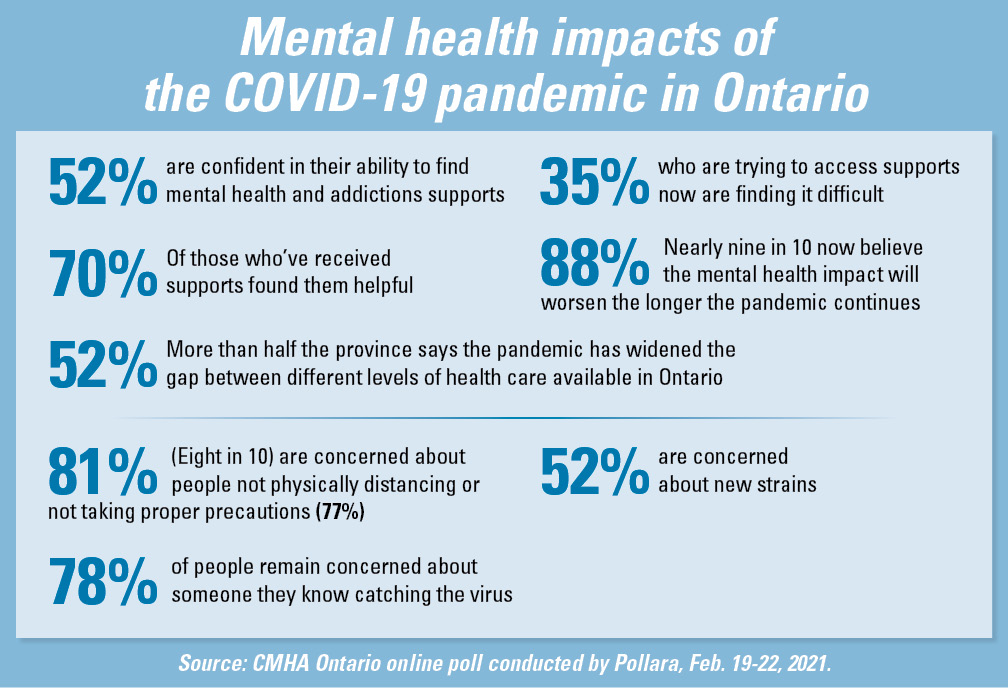WELLINGTON COUNTY – Mental health experts throughout Ontario are calling on the province to take immediate action to help reduce wait times for access to mental health care.
“Right now, we have 3,520 people as of today waiting for care,” said Helen Fishburn, CEO of the Canadian Mental Health Association Waterloo Wellington (CHMA WW).
“All of those people have been seen at Here 24/7, they’ve been assessed, the crisis situation has been stabilized, and they have been determined appropriate for mental health and addictions care in our system, and 3,520 people are waiting for care right now and we just keep adding to that waitlist every day.
“That is not good enough.”
CHMA WW is one of eight leading mental health and addictions organizations that have partnered to pressure the Ontario government on the need for help from all levels of government.
Almost 75 per cent of the population is facing increased mental health and substance use challenges as a result of the COVID-19 pandemic, according to the CHMA.
But Fishburn says the funding the association currently receives is not enough to provide the support the community needs right now.
“The needs created by the pandemic make this literally a life and death issue for people who are out there suffering and struggling,” said Fishburn.
“We’re at a really critical juncture right now in terms of our system being able to reach those needs.
“It’s now time to demand action, and that’s what this campaign is all about. It’s really saying to the government that we cannot continue to manage the gap between what people have for support, and what they need.”

People of all ages are struggling to deal with the impacts of the pandemic.
Kimberly Moran, CEO of Children’s Mental Health Ontario, stated, “through the pandemic we are seeing highly concerning increases in serious child and youth mental health issues – including increased suicidality and increases in eating disorders.”
She added, “We know before the pandemic wait times and wait lists were already too long. We need the government to partner with us now to reduce wait times – an entire generation of children are at risk.”
“Everything Is Not OK” is the campaign being arranged by Ontario’s leading mental health and addictions organizations, including: Addictions and Mental Health Ontario (AMHO), CMHA, Centre for Addiction and Mental Health (CAMH), CMHO, Ontario Shores Centre for Mental Health Sciences (Ontario Shores), The Royal, and Waypoint Centre for Mental Health Care.
Campaign officials say they are looking for “a mental health and addiction system – supported by long-term and sustainable investments” from the government.
This would include consistent care across the province, so that all Ontarians have the same access to high-quality care, faster and easier access to care, and transparent care that allows people to know how long they are going to have to wait, officials say.
Fishburn says this change is needed because right now “we just get these little tiny pockets of funding that allow us to hire a few more people here and there, but it doesn’t really change the overall picture. That’s what we are asking for, is to change the over all picture.”
“We are going to need a resilient population to recover from COVID-19, and that means addiction and mental health must be a part of the recovery plan,” said Adrienne Spafford, CEO of AMHO.
“The government has repeatedly said that mental health and addiction is a priority. Making high-quality services available to people when they need them is possible and the solutions we are putting forward will make that happen.”
For more information on the Everything Is Not OK campaign visit www.everythingisnotok.ca.
There is also a petition on the site for those who wish to show their support for the campaign.



